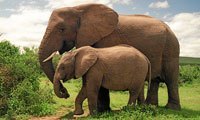
Wildlife conservation groups have intensified calls for government to stop the exportation of baby elephants.
BY CHIPO MASARA
The petition — originated by Johnny Rodrigues — director for Zimbabwe Conservation Task Force (ZCTF), calling for the government of Zimbabwe to cease the exportation of baby elephants to China, the United Arab Emirates (UAE) and France is gaining momentum.
A total of 28 296 people had signed the online petition titled Stop Zimbabwe Elephant Exports to China by 11:30am on Thursday January 15.
Among the signatories of the petition are people from as far as Italy, Spain, New Zealand, France, US and Britain, among others.
The petition, which Rodrigues says has support of the European Union, among others, was brought to life when allegations were thrown around claiming the government was secretly exporting baby elephants to China.
Wildlife authorities in Zimbabwe last December finally confirmed the allegations, announcing its plans to export at least 62 elephants to top up scant State revenue and curb an ever ballooning pachyderm population. Conservationists however believe a much larger number was set to be exported.
Although the State insisted there was nothing illegal or unusual about the move as Zimbabwe had received allocations from the Convention on International Trade in Endangered Species (CITES) to export elephants to suitable destinations, wildlife conservationists were riled by the move.
- Chamisa under fire over US$120K donation
- Mavhunga puts DeMbare into Chibuku quarterfinals
- Pension funds bet on Cabora Bassa oilfields
- Councils defy govt fire tender directive
Keep Reading
Rodrigues, leader of ZCTF — a local animal rights group — has condemned the move saying the elephant calves were being dragged from their mothers to be sent, squashed in containers, to Maputo for export to China.
In 2012, four baby elephants reportedly died on their way to China.
According to ZCTF, the dozens of baby elephants were being exported to China’s zoos and circuses where they were kept in captivity while being mistreated.
“It is cruel to keep the babies from their families. It is unethical and inhumane. These poor animals are being punished simply because they were born in Zimbabwe.”
“Why not keep them in Africa as a natural resource to boost tourism? Besides, these animals don’t belong to the government; they belong to the whole of Zimbabwe. They are stealing from future generations,” said Rodrigues.
In a development that may have a negative impact on the tourism sector’s performance, Rodrigues said Tourism sector minister Walter Mzembi had received an ultimatum from 31 US agents that have threatened to cancel US tourists’ visits unless the government ceased the exportation of the animals.
“They [US agents] have written a letter to [Walter] Mzembi to say ‘release the animals and tourists will come, but if you do not, we will cancel contracts’.”
There is a general feeling that the exports are not in actual fact meant to develop wildlife maintenance in the country, but to enrich an elite few.
Jerry Gotora, chairman of the Parks and Wildlife Authority however, said proceeds from the exports would be used to fund the running of game parks, while part of it would be allocated to communities that border game reserves.
Talking to the National Geographic, Johan du Toit, professor of ecology and conservation of large mammals at Utah State University, said: “I don’t think the way wildlife is being managed is indicative of the Zimbabwe ethos, but that the kleptocracy and the elitists within the government see the resources of the country as up for grabs — even to the extent that they think if they don’t grab it, someone else will.”










